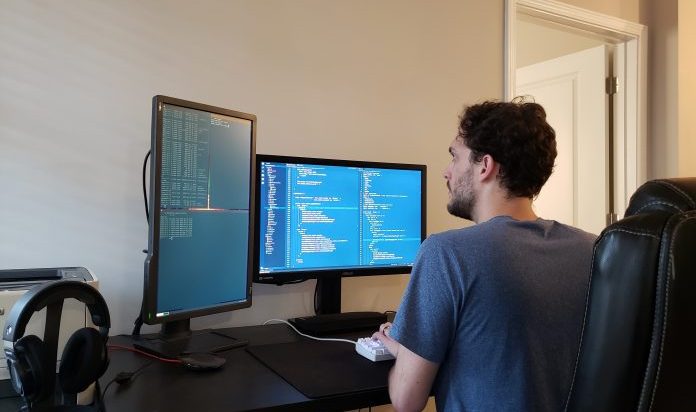What It Takes to Get a “Google-Like Job”: 5 Lessons from Boot Camp Learner Chace Powell

For three years, Chace Powell spent his days waiting for something to happen. Working as a site support technician, he was thoroughly bored—and ready for a change.
“I always liked to solve problems and I’ve always been interested in computers and the web,” he said. “I started doing some coding as a hobby, and it just got to the point where I thought Why not consider this as a career?”
His consideration turned into action when he enrolled at The Coding Boot Camp at UNC Charlotte. Over the course of the six-month, part-time program, Chace learned a lot (coding being number one). But beyond the languages of web development, he discovered some important lessons.
Here are Chace’s top five takeaways from coding boot camp:
1. Face Your Fears Head-On
Web development is a very collaborative field. Coders need to be able to work together as a team to solve problems and build projects. Going into the boot camp, however, Chace struggled with some social anxiety.
Luckily, a cornerstone of the boot camp curriculum is group work. Students are placed into teams to create websites from scratch using the languages they’ve learned, preparing them for similarly collaborative projects in the workforce. Despite his initial nerves, Chace was determined to improve his skills, so he dove into group projects headfirst—coming out the other side happier and more confident.
“Dealing with groups can be hard for me,” he said. “But I found that one of the best parts of the boot camp was working in groups. I’m better at it now because of the boot camp.”
2. Don’t Give Up
The Coding Boot Camp at UNC Charlotte is designed to be rigorous, effectively equipping learners for the challenging world of web development. Chace approached each obstacle head-on—and with pleasure.
“The boot camp was tough, but not unfair. I enjoyed it immensely,” he said.
In fact, Chace found that some of the most difficult aspects of the course were the things he enjoyed the most, one of which came with an “aha” moment.
“The first week we learned React, I thought I don’t understand this at all,” he said. But he was determined to put in the effort to figure it out. “I’m very hands-on with learning. I did all of the assignments two or three times to get over it. In the end, it became my favorite language, partly because it was so rewarding to finally get it.”
3. Take Advantage Of the New Start
For many students, coding boot camps mark the start of an exciting new path. Chace was no exception. In fact, he viewed the experience as more than just a career change; he saw it as an opportunity for his family to make a move.
“We made a list of places and landed on Charleston,” said Chace. “It doesn’t seem far from Charlotte, but it may as well be on the other side of the world.”
4. Learn to Be Patient
It can be difficult to break a habit—especially one that you’ve had for years. The boot camp helped Chace ditch a bad habit he struggled with and build better ones in its place.
“I tend to rush things. If I don’t get to a certain place fast enough, I feel like I’m failing,” said Chace. “While learning to code, I realized it’s important to be patient. You’re not going to get this stuff easy, because it’s like learning a new language—in fact, it is learning a new language. You just have to be patient and thorough.”
That lesson extended well beyond the boot camp classroom. When Chace first started searching for jobs in Charleston, he hit a lot of dead ends.
“I tried going through recruiters, but I didn’t like that experience,” he said. “All the jobs these agencies would offer were entry-level, which isn’t what I needed.”
Chace decided to flex his newfound patience and hold out for the right fit—which is exactly what he found.
5. Practice, Practice, Practice
One of the biggest pieces of advice Chace has for boot camp students (and everyone, for that matter) is to practice.
“Keep practicing, keep digging up information, keep coming up with different projects,” he said.
Practice is crucial when learning to code—but it’s perhaps even more vital after finishing the course.
Chace discovered this when he found a brilliant “Google-like” job. The company, Benefitfocus, was employee-focused, had a great culture, and really seemed to invest in its teams. He eagerly applied online and was invited to a phone interview the next day. Thrilled, he told his career counselor, Kyle, who suggested a mock interview.
“I said, ‘Why do that, it’s so dumb!’ But then I decided to do it, and I’m so glad I did,” Chace said. “The first question he asked me was Tell me a little about you. I froze. There were probably 10-15 seconds of silence.”
After some helpful coaching and a lot of practice, Chace felt more confident. The next day, he spoke to Benefitfocus, touted his new boot camp skills, and landed a job as a UX engineer.
Skills For Life
Three months into his new job, Chace has only good things to say. Already using his boot camp skills (both hard skills like React and soft skills like collaboration), Chace knows he made the right choice.
“The boot camp changed a lot for me,” he said. “I’m in a really cool place with my wife in a Google-like job. That’s the best tuition money I’ve ever spent.”

 Live Chat
Live Chat